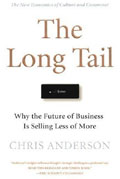The Long Tail
Even before reading Chris Anderson's new book, The Long Tail, you and I -- we, the people on the internet -- are of two minds about it. Part of us has been waiting with zeal, with a virtual palpitating heart, for a new "big idea" book to debate for the rest of the year -- and also, a treatise that will elucidate for our workplace parents (i.e., bosses) why small is the new big, why this niche economy is different than anything ever before, and why this wisdom-of-the-crowds gibberish actually has some evidential support. The other part of us -- the part that has waited so long for this seemingly-eternal-work-in-progress, which, by now, we've already heard our boss, and our boss' boss, and our boss' boss' secretary, repeat the title of so many times (usually, as an inaccurate reference) that we want to retreat to Second Life for the rest of the summer -- yes, this part of us has already deduced this blogged book will be repetitive and cloying and, well, long in the mouth.

Ah, the fragmented public.
For those of you who haven't been gripped by every nuance of the internet economy over the past few years, perhaps some rewinding is in order. Stating the thesis of The Long Tail requires merely a few words: the mass market economy is turning into a niche economy. That's it? Yep, that's it. I suspect those of us who fall in the middle of Gen X will smirk at this proposition. Since approximately the day I left high school, I've been told I'm part of a new micro-marketing culture, that the difference between me and my parents is choice, that fame will be doled out to my friends in tidy 15 minute portions. I've been walking and breathing niche for so long, it's probably time somebody stopped and asked: is all this true?
One thing is true: just the introduction of The Long Tail will zap you with enough aphorisms to instantly transform you into the hottest internet bon vivant at the next Valleywag-crashed party. Simply toss out these maxims over Web 2.0 martinis: "Scarcity requires hits." "The mass market is turning into a market of niches." "The era of one-size-fits-all is ending, and in its place is something new, a market of multitudes." "If the twentieth-century entertainment industry was about hits, the twenty-first century will be equally about niches." Are you writing these down?
But you realize an odd thing about 50 pages into this book: you're not bored. You suspect you should be bored by either the pop economics or the glib utopianism or perhaps, alas, the hash tables. But, somehow, you enjoy the stories that illustrate the overall economic theories. And, most of all, the data points are simply delicious. You want to memorize them for the next time you argue with your friends about topics that feel true but which you don't actually know are true. Did you know...
+ A quarter of Amazon's book sales come from outside its top 100,000 titles.
+ 74 percent of tv households in 1954 watched I Love Lucy; CSI now, 15 percent.
+ Toll-free calling was invented in 1967 by AT&T. By 1992, 40 percent of all long-distance calls on its network were toll-free.
+ Online shopping accounts for 5 percent of American retail spending. It's increasing 25% per year.
+ In the 1960s, the Chevy Impala sedan accounted for 13 percent of the U.S. car market.
+ Yahoo's music video viewership lands somewhere between MTV and VH1 in audience share.
+ 724,000 Americans report eBay as their primary or secondary source of income.
+ 20% of the population lives 8+ miles from a bookstore.
And so on.
You might think that Anderson's purpose in using the bevy of data would be to whip up some evidence to push the overall narrative, but the data actually becomes the story. Anderson (who, we somehow haven't mentioned yet, is the editor of Wired) nicely weaves it all together in a way that makes you realize that he's one of the few people who actually gets the holy triumvirate: culture, media, and economics.
The question that nagged me -- and perhaps it will you, too -- is whether all this fragmentation of culture is actually good for us. It would have been wise to close the book on this topic, but Anderson gets to it a couple chapters before the end (he reserves the final pages for an annoying "how to make a long tail company" list, probably to justify placement in B&N's business section). I'm someone who has previously ranted about the infuriating bullshit of Republic.com, which purported that personalized technologies (i.e., those that expose the long tail) would hurt the spread of information. Nonetheless, I've become worried recently about the loss of salient and persistent talking points even within my little clique of media-savvy culturati. Lately, I've been hearing conversation-enders like this with more frequency: "No, I didn't hear that [too-obscure-for-Pitchfork] record" or "No, I didn't see that [famous-to-hundreds Web 2.0] website" or "No, I haven't rented that [Japanese anime import] DVD." Without getting mealy-mouthed, Anderson scrubs away my apprehension, revealing a world in which you and me -- we, the people on the internet -- are "not so much fragmenting as we are re-forming along different dimensions."
I feel defragged now.
Rex, who is currently working on a book very tentatively titled "Everything You Know Is the Wisdom of the Long Tail Tipping Point," was nominated for a Wired Rave Award in 2004 but has never met Chris Anderson, even though he totally stalked him at the awards party.

